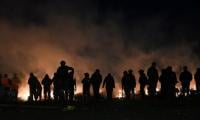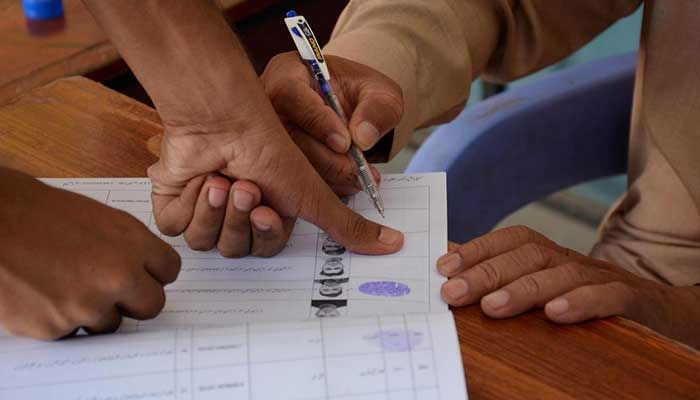News Analysis: Putting off Punjab polls flouts Constitution, experts say
KARACHI: The ECP’s decision to postpone the election in Punjab, citing financial and security challenges, is legally flawed and in violation of the constitution, say legal and political experts who also say that executive authorities are bound by the constitution to assist the ECP in the conduct of elections.
In his comment to The News, Supreme Court advocate Salman Raja says that this is “a new low in our sad constitutional history. This gimmick by the ECP in the service of political expediency will long tarnish its credibility. The perennial question for us seems to be: why do officials in high offices find themselves compelled to act in connivance with the powers that be?”
Lawyer Salaar Khan tells The News that the ECP has tried to “cloak a duplicitous decision in the law. But the fabric is rather transparent, and the decision fails to find support in either the order of the Supreme Court or the constitution.” He explains the ECP’s use of the law thus: “It’s true that the Supreme Court allowed for the ‘barest minimum’ deviation from 90 days. Many had already anticipated that the phrase, vague as it was, would be misused in precisely such a way. But ... the 90-day timer had already been ticking when the court decided the matter. It is rather preposterous to argue that the Supreme Court allowed for a delay of up to four times that entire period (assuming no attempts to delay even further)... The reference to Article 254 of the constitution is similarly strained, as it reverses the intended chain of causation. The provision is not a means to preemptively legitimise deliberate and avoidable violations of the constitution.”
Lawyer and TV host Muneeb Farooq seems to agree, calling the ECP decision in “flagrant disregard to constitutional provisions [and] SC orders.” In a tweet on the matter, Farooq says that the “ECP has issued this order under Sec 58 & 8(c) of the Election Act, 2017. Sec 58 empowers the ECP to change the election plan. [The] ECP only needs to inform the president of its decision to change the election plan. Now, what is the status of the SC order? The battle begins!”
A tweet by lawyer Reema Omer says that the ECP’s “interpretation of [the] SC’s ‘barest minimum’ deviation as permission to postpone PA elections by 5-6 months, and its cynical use of Art 254 to justify defiance of a clear constitutional stipulation are both legally flawed [and] disingenuous. Our political crisis [is] getting deeper, uglier.”
Questioning the funds excuse proffered by the ECP, former ambassador to the US Dr Maleeha Lodhi writes: “According to [the] order postponing elections, [the] finance ministry conveyed inability to release funds for [the] election due to ‘financial crunch and unprecedented economic crisis in the country’. So it has money for government schemes, not polls? What has it done to resolve the [economic] crisis?”
Pointing to the precedent being set, Dr Lodhi asks: “So if we follow the logic and justification of [the] ECP’s postponement decision then democracy and elections can be suspended indefinitely due to the ‘deteriorating security’ situation as determined by executive authorities. All eyes on the Supreme Court now.”
On this point, Salaar Khan also adds that “the ECP is not alone in all this. Executive authorities have an independent constitutional obligation to assist the ECP in conducting elections. In failing to do so, they add Article 220 to the growing list of constitutional provisions that continue to be violated.”
Talking to The News, PILDAT President Ahmad Bilal Mehboob says that “It is very unfortunate that ECP has postponed the Punjab Assembly election well beyond the limit of 90 days set in the constitution.” However, he adds that “We should probably see the decision in the context of the extraordinary and unprecedented circumstances Pakistan is faced with such as the convergence of serious economic, security and political crises. Another unprecedented development was the prospect of holding elections of two provincial assemblies separate from the national and other two provincial assemblies which could dilute the constitutional arrangement of caretaker governments in Pakistan.”
Mehboob too thinks it is now a matter for the Supreme Court. He explains that while “the federal government and the 13-party alliance may not be interested in holding elections because their popularity has gone down in the last 11 months compared to Imran Khan’s support, it is also possible that there are serious and genuine issues in holding the election at this time as determined by the ECP. It is now for the Supreme Court to finally determine whether the reasons given by the government for their inability to assist the ECP in holding elections are really genuine and whether the ECP’s assessment in this context is correct or not.”
-
 'Bridgerton' Season 4: Showrunner Talks About Violet's Steamy Romance
'Bridgerton' Season 4: Showrunner Talks About Violet's Steamy Romance -
 John Tesh Recalls ‘uncomfortable’ Backlash Over ’70s Romance With Oprah Winfrey
John Tesh Recalls ‘uncomfortable’ Backlash Over ’70s Romance With Oprah Winfrey -
 Meghan Markle, Prince Harry Problem Was Not ‘work’ During Time With Royals
Meghan Markle, Prince Harry Problem Was Not ‘work’ During Time With Royals -
 Meta Strikes Multi-billion-dollar AI Chip Deal With Google: Will The New Collaboration Pay Off?
Meta Strikes Multi-billion-dollar AI Chip Deal With Google: Will The New Collaboration Pay Off? -
 Gracie Abrams Breaks Silence After Losing 2026 BRIT Award
Gracie Abrams Breaks Silence After Losing 2026 BRIT Award -
 Deon Cole Takes Swipe At Nicki Minaj In Mock Prayer During NAACP Image Awards Monologue
Deon Cole Takes Swipe At Nicki Minaj In Mock Prayer During NAACP Image Awards Monologue -
 Jennifer Garner Reveals The Actress Who 'carried Through Things'
Jennifer Garner Reveals The Actress Who 'carried Through Things' -
 Shamed Andrew ‘awful’ Time As Trade Envoy Is Laid Bare By Insider
Shamed Andrew ‘awful’ Time As Trade Envoy Is Laid Bare By Insider -
 Belgium Seizes Suspected Russian Shadow Fleet Tanker
Belgium Seizes Suspected Russian Shadow Fleet Tanker -
 Liza Minelli Makes Bombshell Claim About Late Mother Judy Garland’s Struggle With Drugs
Liza Minelli Makes Bombshell Claim About Late Mother Judy Garland’s Struggle With Drugs -
 Shipping Giant Maersk Halts Suez Canal, Bab El-Mandeb Sailings Amid Escalating Conflict
Shipping Giant Maersk Halts Suez Canal, Bab El-Mandeb Sailings Amid Escalating Conflict -
 Matthew McCoughaney Reveals One 'gift' He Achieved With Losing Nearly 50 Pounds
Matthew McCoughaney Reveals One 'gift' He Achieved With Losing Nearly 50 Pounds -
 'Scream 7' Breaks Box Office Record Of Slasher Franchise: 'We Are Grateful'
'Scream 7' Breaks Box Office Record Of Slasher Franchise: 'We Are Grateful' -
 Bolivian Military Plane Crash Death Toll Rises To 20
Bolivian Military Plane Crash Death Toll Rises To 20 -
 'Sinners' Star Blasts Major Media Company For 2026 BAFTAs Incident
'Sinners' Star Blasts Major Media Company For 2026 BAFTAs Incident -
 Inside Scooter Braun, Sydney Sweeney's Plans To Settle Down, Have A Baby
Inside Scooter Braun, Sydney Sweeney's Plans To Settle Down, Have A Baby




